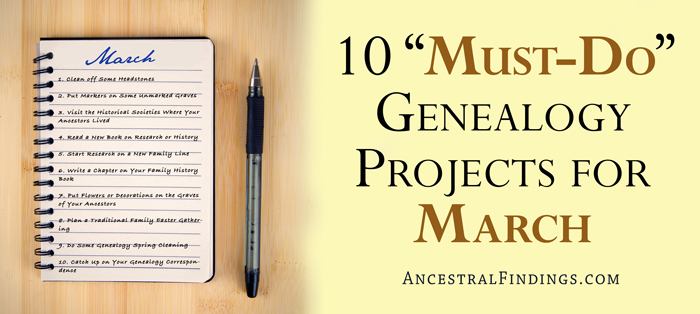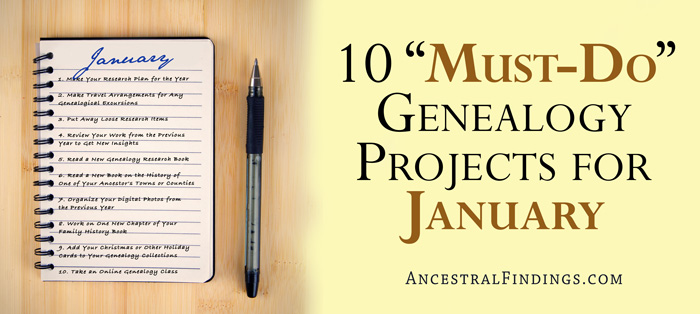It's time to start deciding what your main genealogy projects will be in June. Each individual month has certain genealogical projects to which it is best suited. You can focus just on these projects, or incorporate them into your regular genealogy research. These are the top ten “must do” genealogy projects for June. Each of these projects will add detail to your genealogy research that will make it richer and more informative, and give you a better understanding of your ancestors. This will make your research much more valuable to future generations.
1. Research How Your Ancestors Celebrated Father's Day
Father's Day has been celebrated since the early 20th century, which means at least three generations of your family, and maybe more, have celebrated it. Though it was first celebrated not long after the first Mother's Day, it was not as popular and took much longer to take off as a widely accepted holiday. In fact, though celebrations had become regular things by the 1930s, it did not become an official U.S. holiday until 1972. You can look into your family history this month to discover when and how your ancestors celebrated Father's Day. Talk to older relatives, look at old photographs from earlier celebrations, and read old newspaper articles from your town on celebrations of Father's Day at the local level. This will give you a good idea of how your family celebrated it.
2. Put on a Traditional Father's Day Celebration
If you discover your ancestors celebrated Father's Day before your lifetime, and/or before it became a national holiday, use the information you gathered in exploring how they celebrated it and put on a traditional Father's Day celebration for your relatives. Whether this means just a small, intimate family celebration, or a block party involving your neighbors, do it. Be sure to add in traditional foods, decorations, gifts, and other things your ancestors used in their Father's Day celebrations to make it authentic.
3. Design a Father's Day Photo Montage
This makes an excellent addition to your traditional Father's Day celebration, or as gifts to the fathers and other men in your family. Get all the photos you can of the fathers in your family tree, and any photos of traditional Father's Day celebrations you can find, and put them together in a montage set to the song of your choice on your computer. Choose a song that has a particular significance to fathers or Father's Day if you can find one. Otherwise, just go with a song you like. Time the photos to appear just long enough in the montage so that the montage of all the photos ends when the song does. If you choose, you can make it more personal and interesting by labeling the photos in the montage, and/or adding special effects. This is a genealogical artifact you are creating, as well as a gift everyone in your family is sure to enjoy.
4. Research Traditional Picnic Recipes
Summer has been the traditional time for picnics for centuries. Look back as far in time as you care to go to see how your ancestors did picnics. Much of this research will involve recipes as food is the central part of a picnic. Choose a generation, usually the one you can find the most information on regarding picnics, and gather as many traditional recipes as you can. Put them into a book and keep it among the other binders of food-related research you have done on your family.
5. Give a Traditional Picnic
There's no point in having all those old-time traditional picnic recipes if you don't take them out for a spin at least once. Celebrate the summer the way your ancestors did by having a traditional picnic with all the traditional recipes of the generation you chose to research. Invite as many family members as you like. Or, if your research showed you your ancestors were more likely to have romantic picnics, bring your spouse or other special someone to enjoy it with you.
6. Read a New Genealogy Book
Learning about genealogy and new research methods is something you should continually be doing as a genealogist. Reading a new genealogy book each month is a good way to stay on top of things and continually sharpen your skills. Try some of the methods in the books you read, as you read them. You may be surprised at what new information you find to put on your family tree. – Read More
7. Read a New History Book
Genealogy and history go hand in hand. In addition to learning about different methods of researching genealogy, you should also read about the times and places where your ancestors lived. You might find out something specific about them if you're lucky. At the very least, you will learn about the world they lived in and get a better idea of what their lives were like and what kind of people they were.
8. Write a New Chapter on Your Family History Book
Whether you are planning to publish your family history for the public, or just your family, making a goal of writing one chapter a month will make it easier and more manageable for you to do. If you have completed a family history book on one line of your family, start a book on a new line by writing the first chapter of the new book.
9. Research Summer Games Your Ancestors Played as Children
What did your ancestors do as children when there was no school? Look into it, going back as many generations as you can manage to gather information. Even when there was no traditional summer vacation from school and vacations happened at other times, and even when kids did not go to school at all, they still played. Find out what they played in the warm months. This adds a nice detail to your family tree, and you can teach and play these games with your own kids. This may be a good way to get them interested in family history if they like the games.
10. Study Summer Camp Traditions
Summer camp tends to be a 20th-century phenomenon, but you may still be able to find information on the summer camp experiences of your parents, grandparents, and maybe even great-grandparents. Gather information on local camps, as well as ones in nearby states, and look at their historical records. What did the kids do at the camps? Are there any vintage brochures or pictures? Did your ancestors save letters they wrote home, crafts they made at camp, or pictures they took while there? If so, gather them into a family summer camp scrapbook. It will let you get to know your ancestors so much better.




